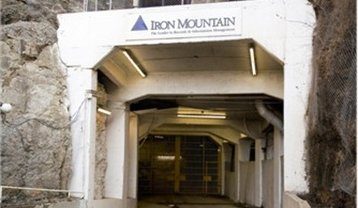Elon Musk and his Department of Government Efficiency (DOGE) have criticized a federal contract with Iron Mountain to store physical records.
However, the CEO of Iron Mountain said that such contracts were only a small percentage of total revenue, and opportunities lay in working with DOGE.
"There's a limestone mine where we store all the retirement paperwork," Musk said during a speech from the Oval Office. "You look at this picture of this mine, this mine looks like something out of the '50s because it was started in 1955. It's like a time warp."
He added: "And then the limiting factor is the speed at which the mineshaft elevator can move determines how many people can retire from the federal government. And the elevator breaks down sometimes, and then nobody can retire. Doesn't that sound crazy?"
That latter claim does not appear to be true - a 2019 Government Accountability Office report criticized the process, and said that manual work, understaffing, and incomplete applications were to blame for the delays, not elevator issues.
The facility in question is Iron Mountain's Pennsylvania site, a former mine that is used for both paper storage and modern data center storage.
Its use as a federal records storage and processing facility has long been criticized - before the GAO report, the Washington Post in 2014 described it as a 'sinkhole of bureaucracy' and described multiple failed efforts to digitize the process across multiple administrations.
Whether Musk and DOGE plans to slowly shift the US Office of Personnel Management's Retirement Operations Center to a digital platform, or simply make dramatic cuts as it has done elsewhere, is unclear.
But Musk's comments immediately caused Iron Mountain's share price to drop. Alongside a revenue miss, the company dropped by more than ten percent.
Speaking during the company's latest earnings call, Iron Mountain CEO Bill Meaney spun the news as a positive. First, he downplayed the scale of the contract: "We work for more than 200 agencies of the US federal government, both as a direct provider and subcontractor of services. The physical storage of documents accounts for approximately $10 million in revenue. Correspondingly, this represents about 0.5 percent of our total physical volume."
He then pointed towards the greater revenue possibilities from the shift to digital: "We also generate $130 million in data center and digitization transformation services. We have been growing in both of these areas with the government over the last few years as we assist certain agencies with process automation and digitization. As the government continues to drive to be more efficient, we see this as a continued opportunity for the company."
Iron Mountain did not respond to requests for comment.




